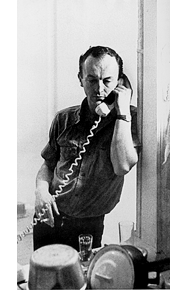The husband recently scolded me for reading the Wikipedia episode guide for Twin Peaks as we neared the end of the series. I argued that it, in no real way, affected my enjoyment of the show because it is not always the story line that is surprising, but the way in which it is presented to the viewer. He disagreed vehemently.
I still stand by my point—-take any novel, particularly 20th century novels. Portrait of the Artist as a Young Man, Naked Lunch, Tropic of Cancer, anything by Beckett, Kerouac, etc etc. Now ask yourself: Is it the plot or the method in which the story is told that compels you to continue reading?
This is particularly telling because I’ve been brushing up on books I should be familiar with for a literature exam. I’ve read a solid 90% of the suggested list, but there are always more and more “classics” that rear their heads on suggested reading lists. I don’t have time to read them all, so I’ve done perhaps the most dastardly thing an academic could do: read the boiled down plot summaries, character analysis and contextual information.
This morning I read about 10 of these “cheats” and found myself gloriously entertained, curiously following the paragraphs of quick moving action and character development. I was amazed at how incredibly similar the plot movements are for so many of these books—-cross referencing other books in my brain and already composing the “select two texts from this list and analyze” essay prompts.
It makes me want to write. I don’t really consider myself a writer anymore, but this kind of activity inspires me. Yet I know that ultimately, I’m focused on plot. The movement of action and development. That I can put forward the pertinent information, but become incredibly trite when going for effect. I’m no good at spinning the story and letting it slowly uncurl and stretch across the pages. I rush. I peek ahead.
Tell me where the story is going. Then I can show you how to get there.
Monday, June 29, 2009
Friday, June 26, 2009
Book 14: The Old Man and the Sea
The Old Man and the Sea
by Ernest Hemingway
Another book I managed to have never read in school, much to my surprise. I've heard many a moan over the contents: following an old man in a boat trying to catch a fish for a hundred pages. Good thing their teachers didn't assign Moby Dick.
It was good. I love Hemingway's pacing and attention to detail. The stream of consciousness of the man's struggle was exactly the kind of insightful reflexivity I adore Hem for. I knew that it would end up empty, a sense of denied victory. That's what the Lost Generation is about: A failure of intention and the lack of power to change fate. Silent victories and how we deny ourselves the celebration because of our mental image of the entire situation.
I knew that it would end on the pathetic note, the giant fish eaten by sharks before he could sell the meat at the shore. It's classically Hemingway. And good. I'm glad I read it. Certainly not as painful as I suspected.
++
Book 15, however, I'm dreading. I'm left with two that I'd just as soon papercut my eyes with than read. Catcher in the Rye and The Red Badge of Courage. Maybe I'll just read the cheat-sheet notes and pick up something I like.
by Ernest Hemingway
Another book I managed to have never read in school, much to my surprise. I've heard many a moan over the contents: following an old man in a boat trying to catch a fish for a hundred pages. Good thing their teachers didn't assign Moby Dick.
It was good. I love Hemingway's pacing and attention to detail. The stream of consciousness of the man's struggle was exactly the kind of insightful reflexivity I adore Hem for. I knew that it would end up empty, a sense of denied victory. That's what the Lost Generation is about: A failure of intention and the lack of power to change fate. Silent victories and how we deny ourselves the celebration because of our mental image of the entire situation.
I knew that it would end on the pathetic note, the giant fish eaten by sharks before he could sell the meat at the shore. It's classically Hemingway. And good. I'm glad I read it. Certainly not as painful as I suspected.
++
Book 15, however, I'm dreading. I'm left with two that I'd just as soon papercut my eyes with than read. Catcher in the Rye and The Red Badge of Courage. Maybe I'll just read the cheat-sheet notes and pick up something I like.
Wednesday, June 24, 2009
Book 13: A Raisin in the Sun
A Raisin in the Sun by Lorraine Hansberry
I'll admit it: I never read this in school. That being said, I'm not entirely surprised. It is so forward in its issues, in the talk and feel of discouragement and power. It's one of those texts that teachers want to teach but know isn't easy--the parent complaints, mob mentality. The things that you have to preface and learn every page along the way.
I read this in one night--as a play that is only suitable. I was concerned that I'd have trouble following it because I'm a prose reader, novels all the way. Drama and character dialogue can get confusing. I was never lost. In fact, I was so on the story and the turning of the plot that I even speculated what was happening.
"She's pregnant, isn't she."
"She's going to have an abortion, isn't she."
"He's going to take all the money, isn't he."
For being the first classic of the summer, the first book on a short list of classics I missed in school and need for my exam, I'm pleasantly surprised. Impressed. Really impressed.
I'm almost certain book 14 wont follow it well.
Sunday, June 21, 2009
Books 10, 11, 12....
I'm falling behind on my reviews. I've been busy, but reading. If anything, this has become an archive for how much I can get through in a year after years of force-fed reading and then complete avoidance.
Book 10: The Sun Also Rises by Ernest Hemingway. Finished end of May.
(1950's paperback picture not available)
Definitely in my top 5 novels. I've read it several times, this run through with my husband as we jet-set from obligation to obligation for our wedding. It was fun to read it with him since he never had. The biting wit and concise articulation Hemingway has in this one is unparalleled. Plus it makes us want to move to Spain and drink all day.
Book 11: White Noise by Don Delillo. Finished the middle of June.
(too lazy to find the picture)
It was okay. I got very tired of the symbolic repetition. Very tired. Maybe monotony was part of the theme itself, coupled with death and overall life-poisons. I could have done without reading this one, but found it hilariously ironic and telling of academia (and life in general) that he could be the foremost Hitler scholar who couldn't speak German and who was terrified of death itself (despite being surrounded by one of the most appalling genocides in history).
Book 12: The Teacher's and Writer's Handbook of Poetic Forms
Yup. Not really a choice reading, but very good. I'm up for certification renewal and have to brush up on all these lit basics and terms for an overpriced exam this summer. It's all very ridiculous and I'm thoroughly unhappy about it. However, it is a nice excuse to go shopping on my own shelves which could rival most experts in the field in their academic prowess.
+++
I wish I could say the next books would be a return to better reviews and more fun. Sadly, the next two months will be dedicated to exam reading and dusting off classics I'd have long forgotten about if I had my way. Books on theory and handbooks on terms, methods, schools of thought, movements....
I know this much: None of my English teachers knew anything close to this stuff and taught classes. And even with my MA, I'm feeling like I'm ill prepared. Who takes this test? People who don't even MAJOR in English and are finishing a BA. Talk about just making money. People specialize, not memorize the Norton Anthology from the survey courses they took 5-6 years ago. Blah, blah blah, yadda yadda, misery. As if my job wasn't bad enough.
Book 10: The Sun Also Rises by Ernest Hemingway. Finished end of May.
(1950's paperback picture not available)
Definitely in my top 5 novels. I've read it several times, this run through with my husband as we jet-set from obligation to obligation for our wedding. It was fun to read it with him since he never had. The biting wit and concise articulation Hemingway has in this one is unparalleled. Plus it makes us want to move to Spain and drink all day.
Book 11: White Noise by Don Delillo. Finished the middle of June.
(too lazy to find the picture)
It was okay. I got very tired of the symbolic repetition. Very tired. Maybe monotony was part of the theme itself, coupled with death and overall life-poisons. I could have done without reading this one, but found it hilariously ironic and telling of academia (and life in general) that he could be the foremost Hitler scholar who couldn't speak German and who was terrified of death itself (despite being surrounded by one of the most appalling genocides in history).
Book 12: The Teacher's and Writer's Handbook of Poetic Forms
Yup. Not really a choice reading, but very good. I'm up for certification renewal and have to brush up on all these lit basics and terms for an overpriced exam this summer. It's all very ridiculous and I'm thoroughly unhappy about it. However, it is a nice excuse to go shopping on my own shelves which could rival most experts in the field in their academic prowess.
+++
I wish I could say the next books would be a return to better reviews and more fun. Sadly, the next two months will be dedicated to exam reading and dusting off classics I'd have long forgotten about if I had my way. Books on theory and handbooks on terms, methods, schools of thought, movements....
I know this much: None of my English teachers knew anything close to this stuff and taught classes. And even with my MA, I'm feeling like I'm ill prepared. Who takes this test? People who don't even MAJOR in English and are finishing a BA. Talk about just making money. People specialize, not memorize the Norton Anthology from the survey courses they took 5-6 years ago. Blah, blah blah, yadda yadda, misery. As if my job wasn't bad enough.
Subscribe to:
Comments (Atom)


